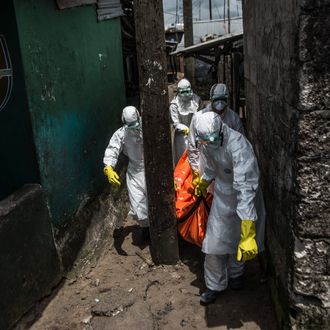
You make hilarious, if slightly nervous, jokes about Ebola all day, but at night, your dreams betray your real feelings. Confessing the previous night’s Ebola dreams has become increasingly common on social media lately:
It doesn’t take a huge stretch of the imagination to understand why Ebola is infecting everyone(’s dreams). When you spend nearly every waking moment of your day staring at screens that fill your brain with horrible news, sometimes, fragments of those real-life nightmares start to leak into your dreams. And while scientists aren’t sure exactly why we dream (or sleep, for that matter), it seems clear that the things that concern us most while we’re awake continue to disturb us as we sleep. As the American Psychological Association once phrased it:
Dreams, say modern dream theorists, are extensions of our waking lives that tend to explore the emotional and practical issues and problems that concern us the most.
Sleep in general — and perhaps dreams in particular — helps your brain process what you learned during the day; your subconscious is making connections your awake-self couldn’t quite make, according to the APA. And this seems to be vital in helping us deal with strong emotions — particularly negative ones, like anxiety — because dreams help us diffuse some of the intensity of those anxious feelings. Scientific American explained this in a 2011 article:
Dreams seem to help us process emotions by encoding and constructing memories of them. What we see and experience in our dreams might not necessarily be real, but the emotions attached to these experiences certainly are. Our dream stories essentially try to strip the emotion out of a certain experience by creating a memory of it.
This way, the emotion itself is no longer active. This mechanism fulfils an important role because when we don’t process our emotions, especially negative ones, this increases personal worry and anxiety.
In fact, severe REM sleep-deprivation is increasingly correlated to the development of mental disorders. In short, dreams help regulate traffic on that fragile bridge which connects our experiences with our emotions and memories.
In other words, without the Ebola dreams, you’d likely be a lot more freaked out by the virus than you already are. Sweet Ebola dreams, everyone!




